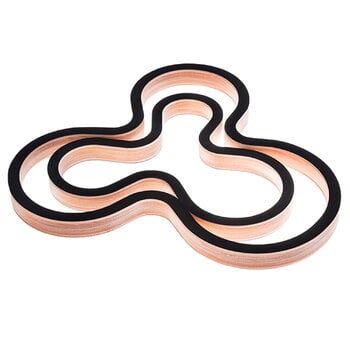Majamoo pot stand, designed by Jani Martikainen, is well fitted for serving hot pots or cold dishes, and its playful shape also serves as a decorative item. Majamoo trivets are made of Finnish birch plywood that emphasizes their wavy, organic appearance. They are available in different sizes and can be used separately or nested together. Majamoo trivets were awarded a prize in Alvar Aalto's centenary year competition. The set includes two trivets in different sizes: medium and large.
Pot stand set, black
Majamoo
Description
Majamoo pot stand, designed by Jani Martikainen, is well fitted for serving hot pots or cold dishes, and its playful shape also serves as a decorative item. Majamoo trivets are made of Finnish birch plywood that emphasizes their wavy, organic appearance. They are available in different sizes and can be used separately or nested together. Majamoo trivets were awarded a prize in Alvar Aalto's centenary year competition. The set includes two trivets in different sizes: medium and large.
Product details (5)
- Material
- Birch plywood
- Colour
- Black, birch
- Height
- 1.4 cm
- Length
- 16–21 cm
- Width
- 16–21 cm
- Product ID
Designer
Jani Martikainen (b. 1971) is a Finnish designer and interior architect who graduated from the University of Art and Design Helsinki. The most popular products designed by Jani Martikainen are Majamoo wooden trivets, which were awarded a prize in Alvar Aalto’s centenary year competition.
View all productsReviews (8)
4.88
Based on 8 reviews
-
A
anonyymi
Turku, Finland
Tyylikäs
408 days ago
-
L
Lilian W
United States
Har köpt flera grytunderlägg som present - brukar bli mycket uppskattade!
278 days ago
-
M
Maarit P
Helsinki, Finland
Pannunaluset ovat tyylikkäät & kauniit, kelpaavat todella olla esillä.
277 days ago
Sustainability
The Product Sustainability Framework, our criteria of sustainable design, helps you find the most sustainable products in our selection. Read below which sustainability criteria this product has met.
Working conditions & labour 9/9
-
Equal opportunities for all employees
-
Commitment to UN Global Compact, fair compensation for all employees
-
Corporate responsibility requirements defined and communicated for suppliers
-
Systematic work for improved inclusion and well-being in the workplace
-
Transparent supply chain
-
Suppliers' compliance to a code of conduct ensured
-
Direct suppliers audited and certified
-
Compliance to the UN Guiding Principles on Business and Human Rights ensured in the supply chain
-
Support for community involvement in the supply chain
Eco-friendly production 8/9
-
Fair and resource-wise water-use in production
-
No incineration or landfilling of returned items
-
No use of endangered species as materials
-
No direct environmental emissions or waste (excl. GHGs) from production
-
The sustainability of direct suppliers' production is addressed and monitored
-
Production and material sourcing that respect biodiversity, animal rights, and natural ecosystems
-
Material-efficient and ecological packaging
-
No potentially harmful chemicals used in own production
-
Positive impact on nature’s well-being through operations that regenerate natural ecosystems
Climate impact 6/8
-
Company's direct greenhouse gas emissions identified and commitment to reduction
-
Product's carbon impact identified and commitment to reduction
-
Guidance on energy- and eco-efficient use of the product
-
Contribution to climate initiatives beyond the brand’s direct operations
-
Low-carbon or compensated transportation
-
Carbon neutral or carbon negative product
-
Carbon footprint of the product calculated and goals set to reduce it
-
100 % renewable energy in own production and operations
Sustainable materials 6/6
-
Sustainable and long-lasting material choices
-
No harmful or hazardous substances
-
Responsible raw material sourcing and production
-
Materials suited for circularity: monomaterials, recyclable finishings, renewable or recycled contents etc.
-
Ecological materials: natural, biodegradable, recyclable or recycled contents
-
Outstanding materials in terms of innovativeness, responsibility, sustainability and circularity: local production or sourcing, 100 % recycled content, C2C-certification etc.
Circular design 5/5
-
High aesthetic quality promoting long-term use of the product
-
Technically durable product design and material choices
-
Design for enduring life-long quality
-
Design and support for product maintenance, repair and upgradability
-
Innovative circular design solutions: circular service system, resale platform, remanufacturing, collection of used products, etc.




